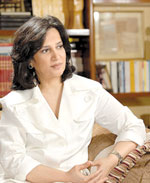
|
 |
 |
|
|
|
|
|
|
|
|
|
|
|
|
|
|
|
|
|
|
|
|
|
|
Minister of Information: Broadcasting 'Hujjaira' Confessions is LegalAfter mounting criticism over the broadcasting of Hujjaira detainees' confessions (accused of plotting to overthrow the regime) and its violation of the Bahrain Constitution, Member of Parliament, Mohamed Al Mizel, asked the Minister of Culture and Information Mai Al Khalifah about the role of State TV and radio agencies in the illegal broadcasting. The Minister responded by saying that TV employees had complied with the Public Prosecutor's order and had adhered to the limitations imposed by the order during the preparations, filming and production of the broadcast. The employees merely did the technical work required of them. She added that 'it is not the job of the Ministry of Culture and Information, while carrying out a judicial order, to inspect the nature of the broadcasting setting, or to be sure of the presence of lawyers, for it is not for the Ministry of Information to interfere in such matters’. In her response regarding the legal basis for Bahrain TV's broadcast of part of the confessions on 28 December 2008 (despite the fact that the Bahraini Constitution states that an accused is innocent until proven guilty), the Minister of Information stated that this article (20/C) does not prevent the legislator from applying any amendments or restrictions for the purpose of public interests, and that legal amendments do not necessarily contradict constitutional rights.
The Minister also pointed to para. (5) of article (246) of the Penal Code which gives the Public Prosecutor the right to broadcast the names and photographs of the accused before a final judgement is passed in a given case. As for whether the State TV had added sound effects during the broadcast, the Minister commented by saying that 'the artistic editing of shots in all stages of the broadcast were in accordance with the requirements of the Public Prosecutor's order'. On the other hand, human rights activists have reiterated their view that the broadcasting negates both the Constitution and Bahrain's international obligations, and saw in the Minister's responses an attempt to absolve herself of the responsibility of the unconstitutional broadcasting. Abdullah Al Drazi, Chairman of the Bahrain Human Rights Society stated that 'the broadcasting of detainees' confessions prior to a court decision is wrong, and in contradiction with the spirit of article 20 of the Constitution which affirms that 'an accused is innocent until proven guilty'. He also observed that the government should bear responsibility for this violation, highlighting that the detainees did not even know they were being filmed. The broadcasting of the confessions in any media channels before a verdict is reached, is considered a violation of the detainees' rights, and therefore all charges are illegal'. On the other hand, Mohamed Al Ansari, Chairman of the Bahrain Society for Support of Public Freedoms and Democracy, believes that the Public Prosecutor's order to broadcast the confession does not absolve the Ministry of Culture and Information of responsibility in the case. He also believes that the Ministry should admit its wrongdoing and seek to rectify its mistakes, adding that the King's wide scale reform project requires effective contribution from individuals, as opposed to the Ministry of Information's approach. |
